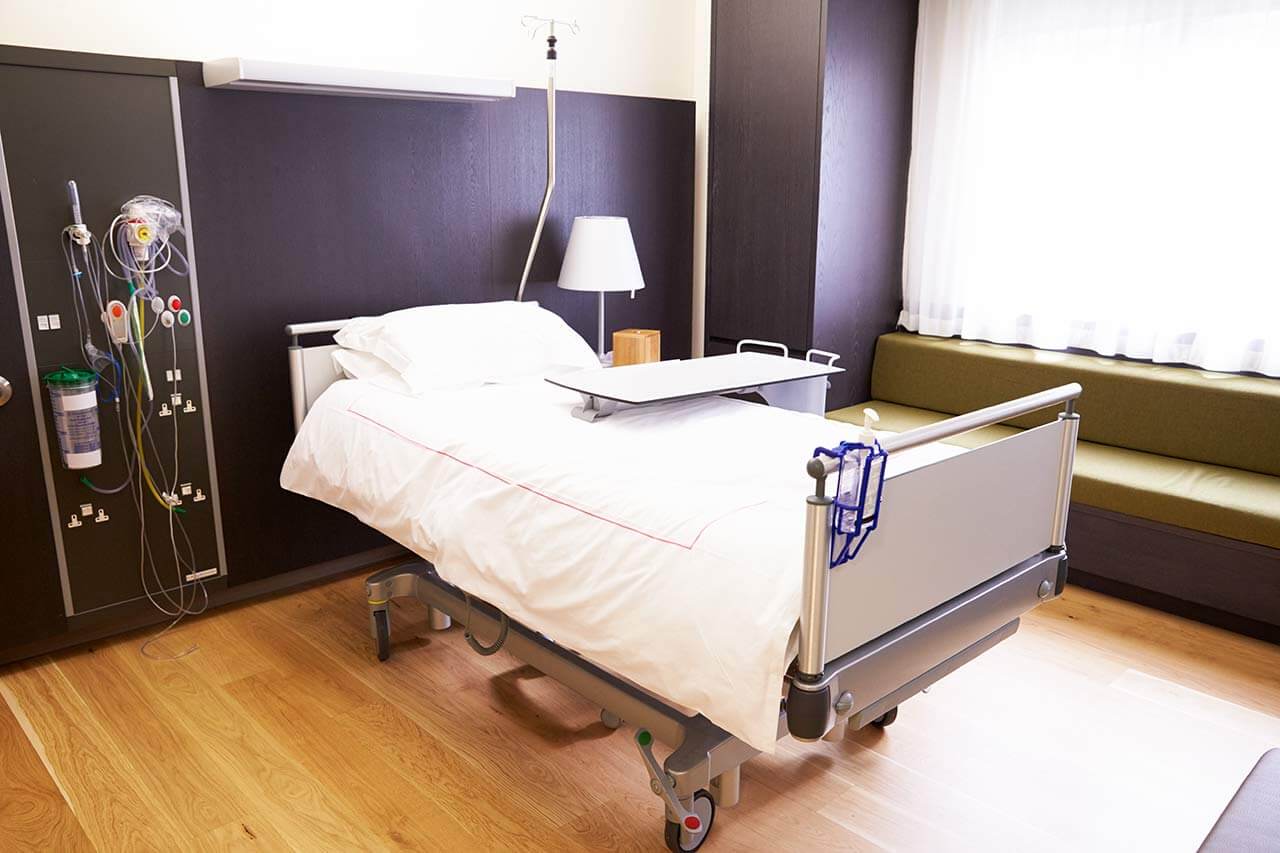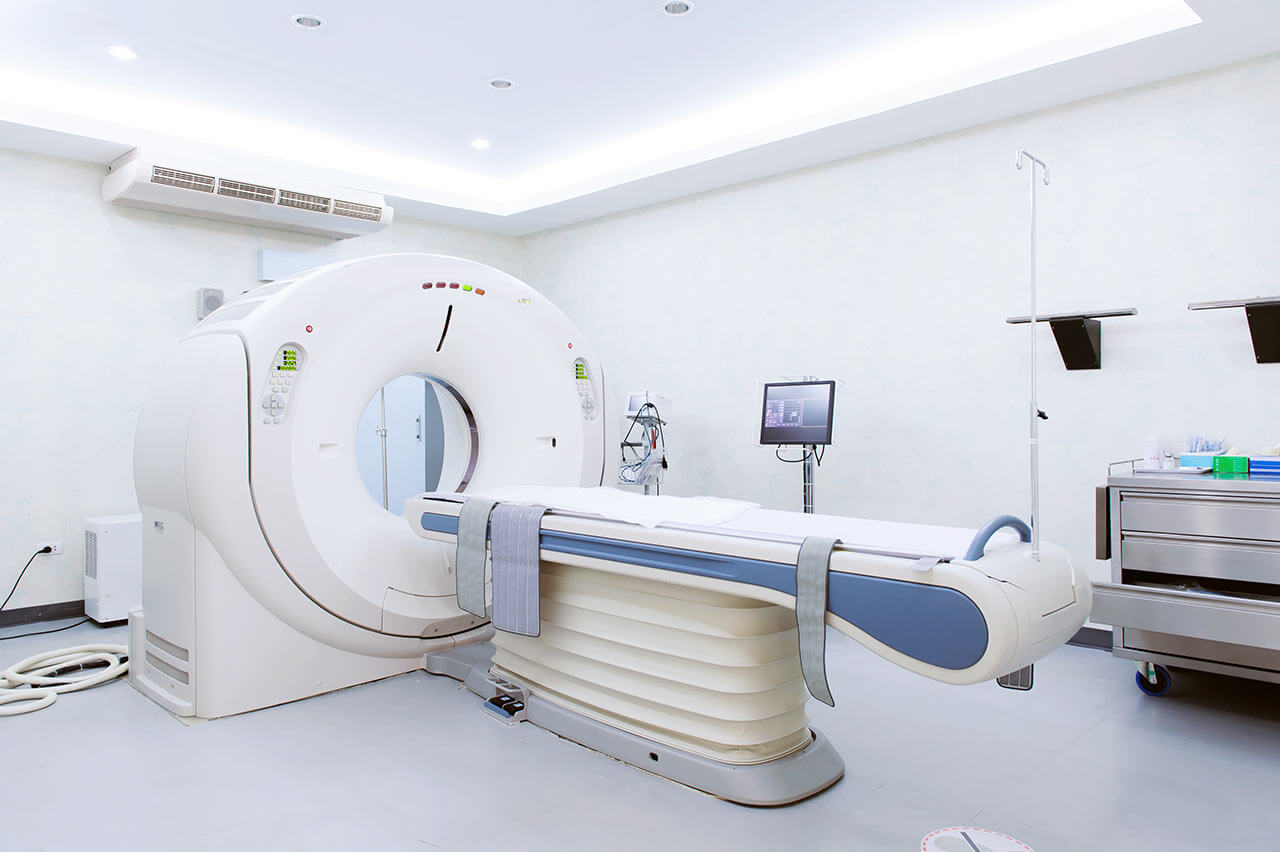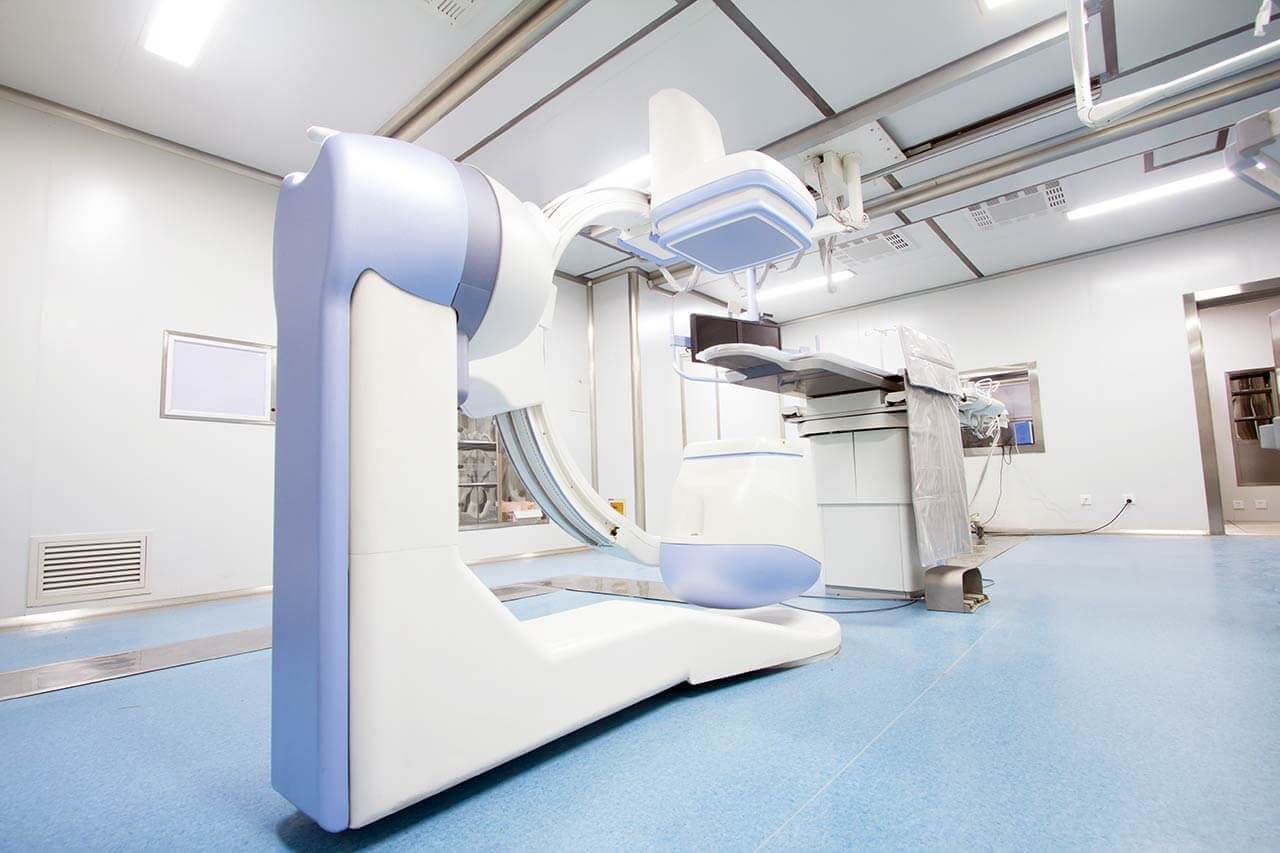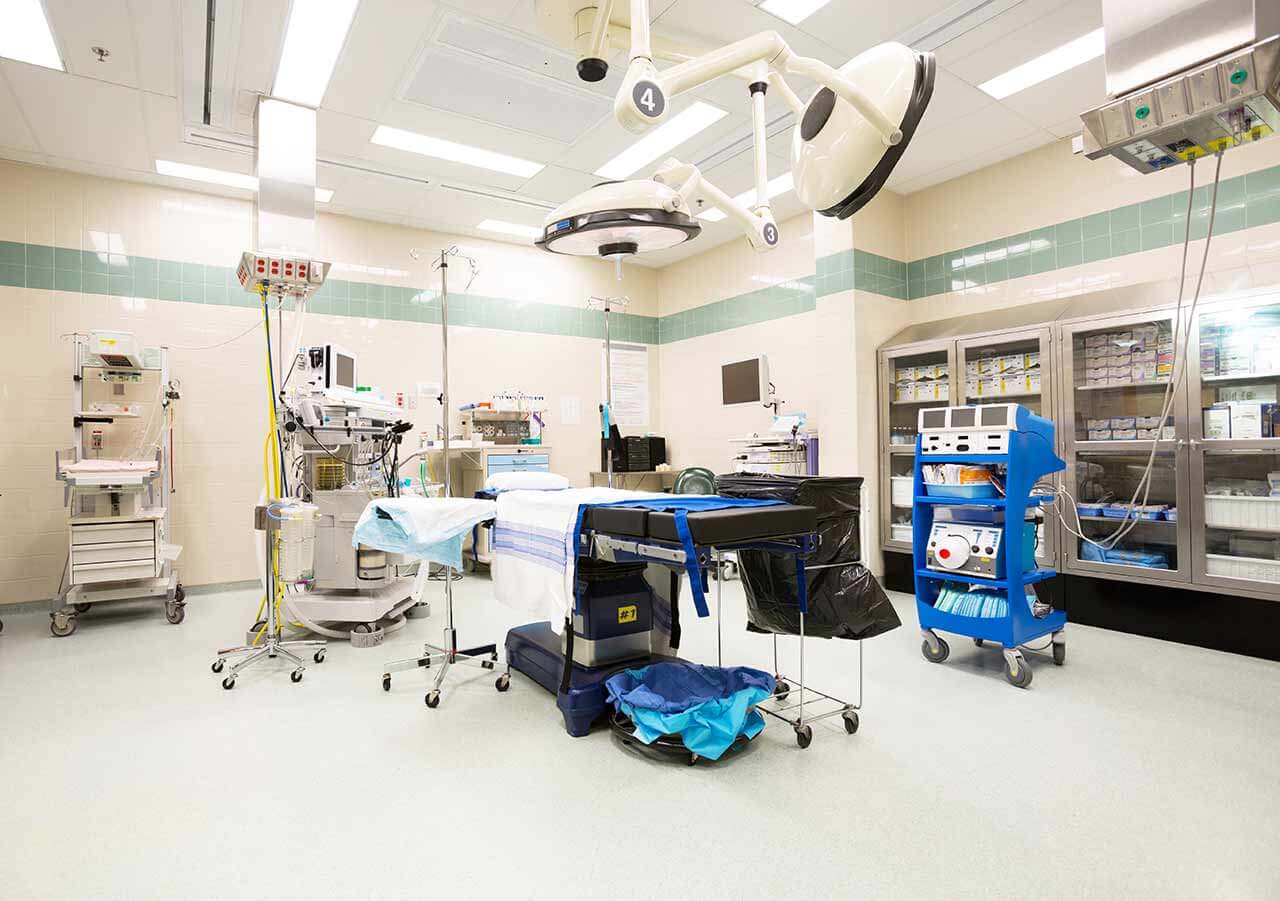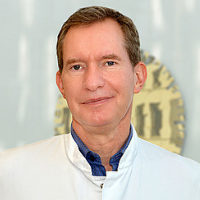
The program includes:
- Initial presentation in the clinic
- clinical history taking
- review of medical records
- physical examination
- laboratory tests:
- complete blood count
- general urine analysis
- biochemical analysis of blood
- TSH-basal, fT3, fT4
- tumor markers
- inflammation indicators (CRP, ESR)
- indicators of blood coagulation
- abdominal ultrasound scan
- CT scan/MRI or PET-CT of abdomen
- preoperative care
- cytoreductive surgery to remove visible tumors
inside the abdomen and HIPEC - histological and immunohistochemical
examination of removed tissues - symptomatic treatment
- cost of essential medicines
- nursing services
- stay in the hospital with a full board
- accommodation in a 2-bedroom ward
- elaboration of further recommendations
How program is carried out
During the first visit, the physician will conduct a clinical examination and go through the results of the available diagnostic tests. After that, you will undergo the necessary additional examination, such as the assessment of liver and kidney function, ultrasound scan and tomography of the abdominal organs. Based on the results of the examination, the physician will choose the surgical technique and the type of anesthesia. After that, preparation according to the preoperative standard will start.
Cytoreductive surgery begins with general anesthesia. The intervention is performed as open surgery, i.e. through the incision in the anterior abdominal wall, so that the surgeon can carefully examine the peritoneum and the surface of the abdominal organs. The surgeon removes affected by the malignant process ovaries, areas of the peritoneum and metastases in other internal organs. This stage of the operation can take several hours, since the overall effectiveness of the treatment depends on the completeness of the malignant tissues removal.
At the next stage of the operation, the surgeon inserts several catheters into the abdominal cavity. Through the catheters, a heated solution of a chemotherapy drug is pumped inside. The special system maintains the required temperature (42-43 degrees Celsius), pressure and circulation rate of the medicinal solution. The solution mechanically flushes out blood clots and remnants of malignant tissues, and a heated chemotherapy drug destroys micrometastases in internal organs and lymph nodes (micrometastases can’t be detected by the naked eye).
After 1-1.5 hours, the chemotherapy drug is removed from the abdominal cavity and the abdominal cavity is washed with saline. After that, the surgeon removes the catheters and sutures the incision of the anterior abdominal wall.
After the completion of the operation, you will be transferred to the ward of the intensive care unit, under the round-the-clock supervision of doctors and nurses. In 1-3 days after the operation, your drains will be removed and you will be transferred to a regular ward for further recovery. The whole treatment takes 10-12 days on average.
Finally, the attending physician will evaluate the results of control examinations, schedule the date of discharge from the hospital and give you detailed recommendations for further follow-up and treatment.
Required documents
- Medical records
- MRI/CT scan (not older than 3 months)
- Biopsy results (if available)
Service
You may also book:
 BookingHealth Price from:
BookingHealth Price from:
About the department
According to the Focus magazine, the Department of Adult and Pediatric Gynecology, Mammology at the Charite University Hospital Berlin is one of the best medical facilities in Germany in its areas of specialization!
The department offers a full range of preventive, diagnostic, and therapeutic services for women with diseases of the reproductive system and the mammary gland. The main focus is on the treatment of oncological diseases of the female genital organs and the mammary gland within specialized centers certified by the German Cancer Society (DKG). The department has accumulated significant clinical experience in the treatment of endometriosis, uterine fibroids, cervical dysplasia, urinary incontinence, and pelvic organ prolapse. The facility is developing the direction of pediatric gynecology with an emphasis on the surgical correction of congenital defects, treatment of infectious diseases (vulvitis, vulvovaginitis, and vaginitis), vaginal bleeding, labial adhesions, and ovarian cysts and tumors. A highly professional team of gynecologists and breast specialists with many years of experience takes care of women's health. The doctors pay special attention to comprehensive diagnostics, on the basis of which they create an individual treatment plan for each patient. The specialists are proud of the excellent results of their work, achieved thanks to their professionalism and state-of-the-art technical equipment.
The Head Physician of the department is Prof. Dr. med. Jens-Uwe Blohmer. He is well known in professional medical circles and among patients all over the world. He has been working in the field of gynecology and mammology for more than 30 years. During this time, he has performed more than 10,000 breast cancer surgeries and thousands of surgeries to treat oncological diseases of the female reproductive system. Dr. Blohmer is rightfully proud of his qualifications in laparoscopic and robotic surgery. He is the author and co-author of books and has over 260 publications in medical journals and internet resources.
Cancer of the female genital tract is treated in a multidisciplinary manner using reliable and effective therapeutic methods. The gynecologists of the department specialize in the treatment of ovarian, fallopian tube, cervical, labial, and rare cancers. This direction is certified by the European Society of Gynecological Oncology (ESGO), the European Reference Network on Rare Adult Solid Cancers (EURACAN) and the German Cancer Society (DKG). Each case is considered individually and the optimal treatment tactics are developed. In most cases, the basis of therapy is surgical removal of the tumor; in advanced stages, total removal of the affected organ may be required. Whenever possible, sparing minimally invasive techniques are preferred. Depending on the specific case, the optimal set of conservative methods is selected: chemotherapy, hormone therapy, targeted therapy, antibody therapy, immunotherapy, and radiation therapy. In addition to ensuring high treatment efficacy, great emphasis is placed on patient comfort and maintaining a reasonable quality of life after treatment.
The department's team of gynecologists also regularly treats patients with benign conditions such as endometriosis, uterine fibroids, cervical dysplasia, urinary incontinence, and pelvic organ prolapse. The treatment of endometriosis is one of the key areas of clinical practice. This pathology develops due to the proliferation of endometrial cells outside the uterus. Patients diagnosed with endometriosis are admitted to a specialized center where specialists are highly trained in modern methods of endometriosis treatment. In the early stages of the disease, drug therapy with non-steroidal anti-inflammatory and hormonal drugs is sufficient. Advanced stages of endometriosis are treated with surgical methods. In most cases, laparoscopic surgery is performed under intubation anesthesia. The extreme measure is hysterectomy (surgical removal of the uterus). This surgical intervention is indicated for women with adenomyosis, which is the growth of endometrial tissue into the inner layers of the uterus (myometrium). An important condition for this surgery is that the woman has no reproductive plans.
The therapeutic offer of gynecology is supplemented by medical care for girls and young women with pathologies of the reproductive system. The team of pediatric gynecologists focuses on patients with genital infections, vaginal bleeding, labial adhesions, pathological lesions of genital skin, external and internal genital malformations, ovarian cysts and tumors, pubertal disorders, painful menstruation (dysmenorrhea) and endometriosis in adolescents. Doctors conduct comprehensive consultations for young patients, during which they prescribe the necessary diagnostic tests and treatment measures.
The primary clinical focus of the department's mammologists is the treatment of breast cancer, including hereditary forms. Doctors work in a specialized DKG-certified Breast Center that is part of the Charite Comprehensive Cancer Treatment Center. Therapeutic options include comprehensive diagnostics, careful planning of personalized treatment, implementation of all necessary therapeutic measures (surgery, chemotherapy, hormone therapy, radiation therapy, and immunotherapy), and follow-up care. In the case of mammary gland resection, modern types of plastic surgery are performed using implants and the patient's own tissues. An important part of the treatment is psychological support, as the diagnosis of cancer is always accompanied by fears and negative emotions.
Some of the key areas of daily clinical practice in the department include the following:
- Diagnostics and treatment of malignant gynecological diseases
- Diagnostics and treatment of uterine cancer
- Diagnostics and treatment of cervical cancer
- Diagnostics and treatment of ovarian cancer
- Diagnostics and treatment of vulvar cancer
- Diagnostics and treatment of fallopian tube cancer
- Diagnostics and treatment of vulvar cancer
- Diagnostics and treatment of rare forms of gynecological tumors
- Diagnostics and treatment of gynecological neuroendocrine tumors
- Surgical treatment
- Conservative treatment
- Chemotherapy
- Hormone therapy
- Antibody therapy
- Immunotherapy
- Radiation therapy
- Diagnostics and treatment of breast cancer, including hereditary forms of oncopathology
- Surgical treatment, including reconstructive breast surgery
- Conservative treatment
- Chemotherapy
- Hormone therapy
- Antibody therapy
- Immunotherapy
- Radiation therapy
- Diagnostics and treatment of benign gynecological diseases
- Diagnostics and treatment of endometriosis
- Drug therapy
- Surgical treatment
- Laparoscopic interventions
- Hysterectomy
- Diagnostics and treatment of uterine fibroids
- Radiological therapeutic techniques
- MRI-guided focused ultrasound therapy
- Uterine fibroid embolization
- Surgical treatment
- Myomectomy
- Hysteroscopy
- Combined treatment with embolization and surgery
- Radiological therapeutic techniques
- Diagnostics and treatment of endometriosis
- Diagnostics and treatment of cervical dysplasia
- Cervical conization
- Diagnostics and treatment of urinary incontinence and pelvic organ prolapse
- Conservative treatment
- Surgical treatment
- Diagnostics and treatment of gynecological diseases in children and adolescents
- Diagnostics and treatment of congenital malformations of the genital organs in girls
- Diagnostics and treatment of infectious diseases of the genitourinary system
- Diagnostics and treatment of disorders of puberty
- Diagnostics and treatment of irregularities in the menstrual cycle
- Diagnostics and treatment of painful menstruation (dysmenorrhea)
- Diagnostics and treatment of ovarian cysts and tumors
- Diagnostics and treatment of endometriosis in adolescents
- Diagnostics and treatment of other diseases of female genital organs, mammary glands
Curriculum vitae
Postgraduate Training and Professional Career
- 2000 Habilitation in Gynecology and Obstetrics, Charite University Hospital Berlin.
- Since 2000 Senior Physician, Department of Adult and Pediatric Gynecology, Mammology, Charite University Hospital Berlin.
- 2004 - 2014 Head Physician, Breast Center, St. Gertrauden Hospital in Berlin.
- 2005 - 2014 Head Physician, Department of Obstetrics and Gynecology, St. Gertrauden Hospital in Berlin.
- Since 01.09.2014 Head Physician, Department of Adult and Pediatric Gynecology, Mammology, Charite University Hospital Berlin.
Qualifications
- Certified Senior Surgeon, German Cancer Society (DKG) and German Society for Senology (DGS).
- Certified Breast Surgeon, Association for Aesthetic, Plastic and Reconstructive Surgery in Gynecology (AWOgyn).
- Certified Ultrasound Specialist (DEGUM III), German Society for Ultrasound in Medicine.
Clinical Focuses
- Breast cancer: diagnosis, surgical treatment, chemotherapy, and drug therapy with monoclonal antibodies and hormones.
- Breast reconstruction: implant placement and muscle reconstruction with autologous tissue.
- Intraoperative radiation therapy for breast cancer.
- 3D ultrasound of the mammary glands and ovaries.
- Treatment of ovarian, uterine, and cervical cancer: diagnosis, surgical treatment, drug therapy, and follow-up.
- Drug tumor therapy: chemotherapy, immunotherapy, antibody therapy, and hormone therapy.
Clinical Focuses
- Treatment of gynecological oncological diseases with chemotherapy and surgery.
- Treatment of benign gynecological diseases.
- Laparoscopy.
- Laser therapy for malignant diseases of the female genitals.
- Radical hysterectomy and uterine resection.
Memberships in Professional Societies and Organizations
- Chairman of the Board of the Association of Gynecologic Oncology (AGO).
- Chairman of the Commission for Certification of Breast Centers of the German Cancer Society (DKG).
- Chairman of the Association of Berlin Breast Centers.
- Board Member of the North-East German Society for Gynecological Oncology (NOGGO).
- Deputy Chairman of the Berlin Cancer Society (BKG).
- Advisory Board Member of the Association for Aesthetic, Plastic and Reconstructive Surgery in Gynecology (AWOgyn).
- Board Member of the German Cancer Society (DKG).
Photo of the doctor: (c) Charité – Universitätsmedizin Berlin
Sources:
Vaidam.com - For Medical Travellers
About hospital
According to the reputable Focus magazine, the Charite University Hospital Berlin ranks 1st among the best healthcare facilities in Germany!
The hospital is one of the largest and leading university medical complexes in Europe, and also consistently holds leading positions in the international medical arena. The Charite operates on the basis of the Faculty of Medicine of the Free University of Berlin and the Humboldt University of Berlin. Patients are offered modern diagnostics and treatment with the very latest methods, many of which were developed by professors and scientists of the medical complex. More than half of all German Nobel Prize winners in medicine and physiology, such as Emil von Behring, Robert Koch, and Paul Ehrlich, studied and worked at the Charite University Hospital Berlin. The medical complex includes more than 100 specialized departments and institutes, which helps to ensure that patients receive care in all existing medical specialties. The hospital has exceptional experience in treating complex clinical cases.
Each year, the hospital treats more than 137,800 inpatients and more than 787,700 outpatients. The hospital has a bed capacity of 3,293 beds. A huge medical team consisting of 5,670 scientists and doctors and more than 6,000 nurses work for the benefit of the patients. The main task of all specialists of the medical facility is to restore the patient's health or save his life in critical cases. The hospital has a friendly atmosphere where every patient feels care, respect and empathy.
The Charite University Hospital Berlin is generously funded by the German government, which is why it offers patients the latest generation of excellent equipment and comfortable infrastructure. The Charite medical complex is equipped with da Vinci robotic surgery systems, laser technologies, equipment for endovascular catheter-based interventions, neuronavigation devices, intraoperative monitoring systems, equipment for proton therapy available only in the most advanced medical centers in the world, and many other technologies. All these resources, combined with the experience and professional skills of the hospital's doctors, are the key to providing the most effective and safe treatment in accordance with the highest international medical standards.
The hospital is recognized with a huge number of quality certificates, including DIN EN ISO 9001:2015, certificates from the German Cancer Society (DKG), the German Society for General and Visceral Surgery (DGAV), the German Society for Thoracic Surgery (DGT), the German Hernia Society (DHG), and the ERAS Society.
The Charite University Hospital Berlin is a benchmark in the European healthcare system. Patients therefore receive impeccable medical service, quality care, and personalized service that puts the patient and their individual needs first.
Photo: (с) depositphotos
Accommodation in hospital
Patients rooms
The patients of the Charite University Hospital Berlin live in comfortable rooms made of modern design. Each room is equipped with an ensuite bathroom with a toilet and a shower. The standard room furnishing includes an automatically adjustable bed, a bedside table, a wardrobe for storing clothes, a table and chairs for receiving visitors, and a TV. If desired, Wi-Fi access can be provided. The hospital also offers enhanced-comfort rooms.
Meals and Menus
The patient and his accompanying person have a daily choice of three menus. If for any reason, you do not like the food, you will be offered an individual menu. Please inform the medical staff about your dietary preferences before the treatment.
Further details
Standard rooms include:
Religion
Religious services are available upon request.
Accompanying person
During the inpatient program, an accompanying person may stay with you in a patient room or at the hotel of your choice.
Hotel
During the outpatient program, you can live at a hotel of your choice. Managers will help you to choose the most suitable options.
The hospital offers a full range of laboratory tests (general, hormonal, tests for infections, antibodies, tumor markers, etc.), genetic tests, various modifications of ultrasound scans, CT scans, MRI and PET / CT, angiography, myelography, biopsy and other examinations. Treatment with medications, endoscopic and robotic operations, stereotaxic interventions is carried out here, modern types of radiation therapy are also used. The hospital offers patients all the necessary therapeutic techniques.
- Proton therapy
- CyberKnife treatment
- Hyperthermic intraperitoneal chemotherapy (HIPEC)
- PSMA therapy with Lutetium-177
- Joint replacement in adults and children
These are oncological diseases, benign neoplasms of the brain and spinal cord, heart valve defects, diabetes mellitus and its complications, joint diseases and other pathologies.
- Neurosurgery
- Oncology
- Plastic and reconstructive surgery
- Interventional radiology
- Proton therapy (Proton Therapy Center BerlinProtonen)
The medical team includes more than 4,225 highly qualified scientists and doctors.
